
A doctor who was diagnosed with leukaemia has revealed a surprising symptom she almost ignored.
Ellissa Baskind, 46, has spent much of her working life carrying out operations as a consultant gynaecologist in Leeds.
Over the years, she developed progressively worse back pain, something she put down to the nature of constantly be bent over in her job.
It was at her work Christmas party however, when Ellissa thought something was up after she was left unable to dance due to the pain.
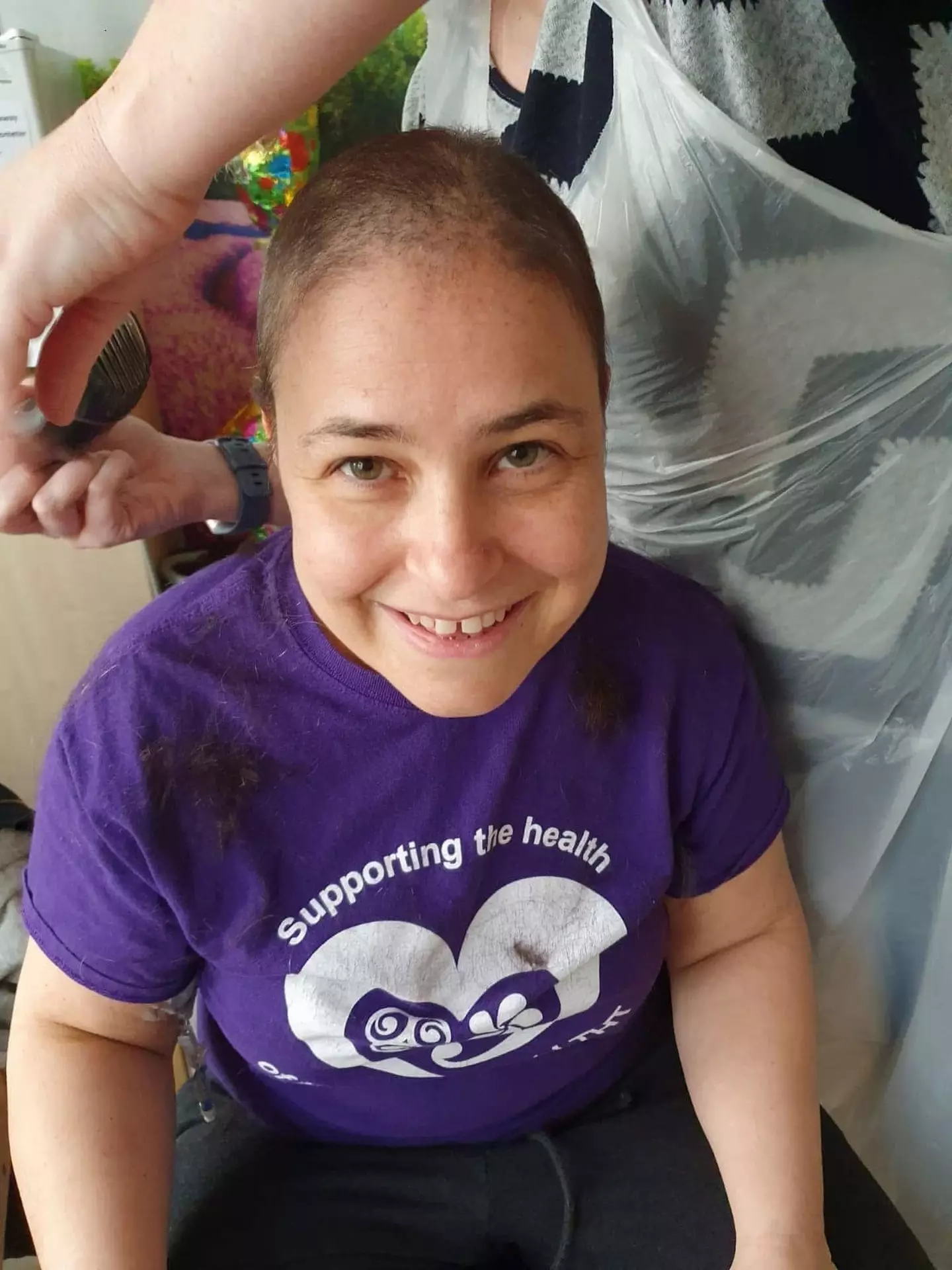
Dr Ellissa Baskind says ‘don’t ignore your symptoms’ (Kennedy News and Media)
Naturally being in the medical field, she went and got an x-ray which came back clear. However, her blood results came back with abnormalities and the mum-of-two was given a shock leukaemia diagnosis.
Ellissa said: “At the time [I was diagnosed] I was doing a lot of operations and you do get yourself into a lot of awkward positions. It’s just the nature of the job.
“It’s not uncommon in my line of work to have back pain. I was getting pain in my shoulder blades which was keeping me up at night.
“Even as a doctor, you don’t think of the worst things. I genuinely thought it was related to my work. I never once thought it was something sinister.
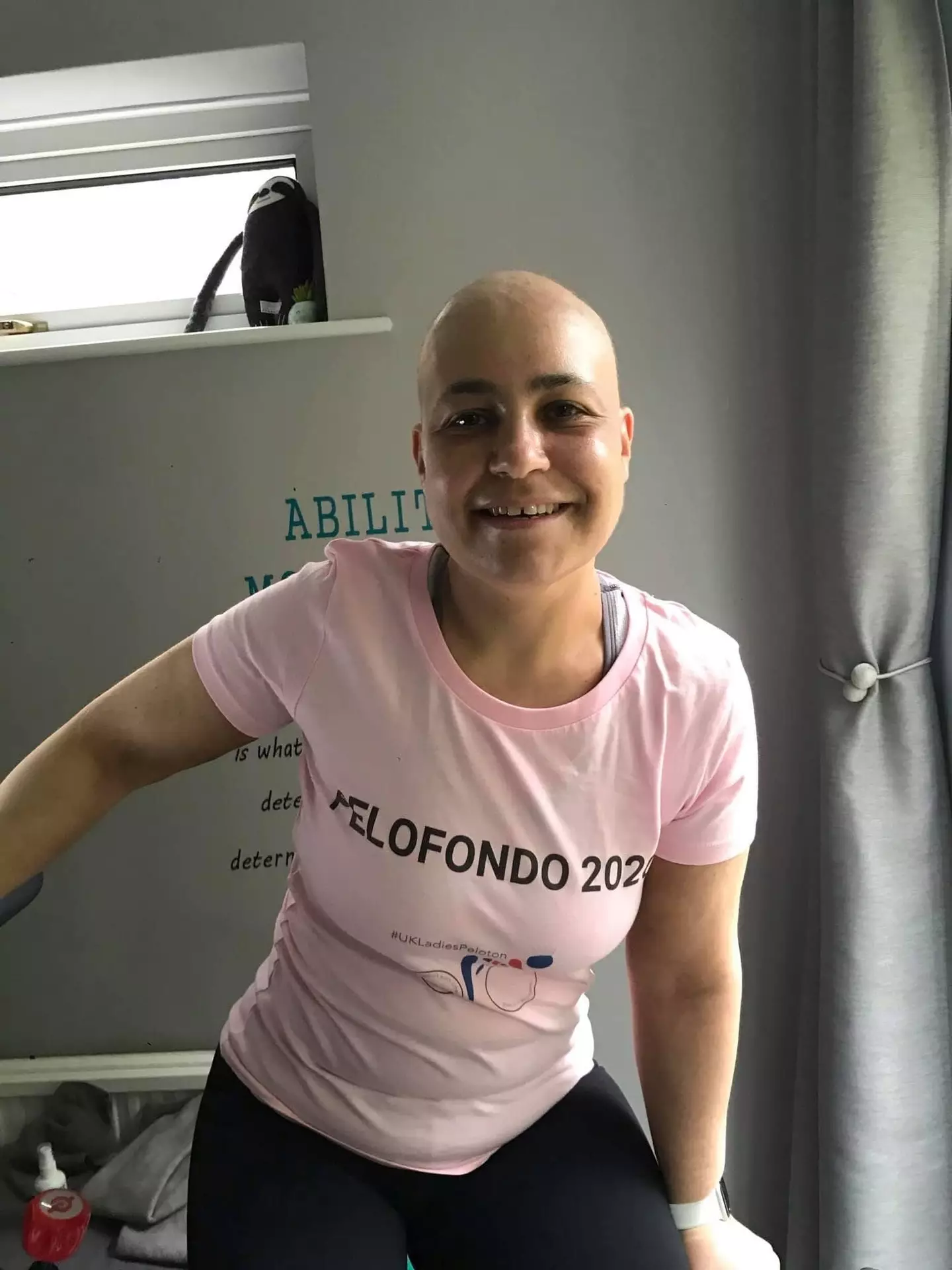
Ellissa was diagnosed with acute myeloid leukaemia (Kennedy News and Media)
“I wasn’t sure I would make it to the Christmas party because this pain was bothering me so much. It was at the forefront of my mind. The pain stopped me from dancing and being able to enjoy myself fully.”
Ellissa was diagnosed with acute myeloid leukaemia – a cancer of the myeloid line of blood cells, characterised by the rapid growth of abnormal cells.
Having to undergo two rounds of chemotherapy, Ellissa then discovered a lump in her breast and was diagnosed with myeloid sarcoma 18 months later.
Ellissa said: “Looking at the literature, there is no cure for myeloid sarcoma. I believed it was palliative. That night I was looking into hospice care and thought it was the end of the road.
“The doctors asked me how much fight I had left in me and I said I’m only interested in a cure. They said there is a chance of a cure but it’s very remote and you would need another stem cell transplant.”

Ellissa said she ‘could have so easily just gone on with my life and missed it’ (Kennedy News and Media)
After undergoing successful stem cell transplant in 2022, she did two more rounds of chemotherapy in June.
Ellissa added: “I’m now in the best health and have hit five years now which is a real milestone. I’m very fortunate.
“The best advice I have to people going through cancer treatment is to take each day at a time. I feel so lucky to be alive. And it’s changed the way I approach patients having been one myself.
“I look back and I felt very well other than that back pain. I could have so easily just gone on with my life and missed it. “Please listen to your body and don’t ignore your symptoms; keep pursuing answers and persevere until you know what is going on.”
If you’ve been affected by any of these issues and want to speak to someone in confidence, contact Macmillan’s Cancer Support Line on 0808 808 00 00, 8am–8pm seven days a week.Featured Image Credit: Kennedy News and Media
Topics: Cancer, Health, UK News

Anish Vij
Advert
Advert
Advert
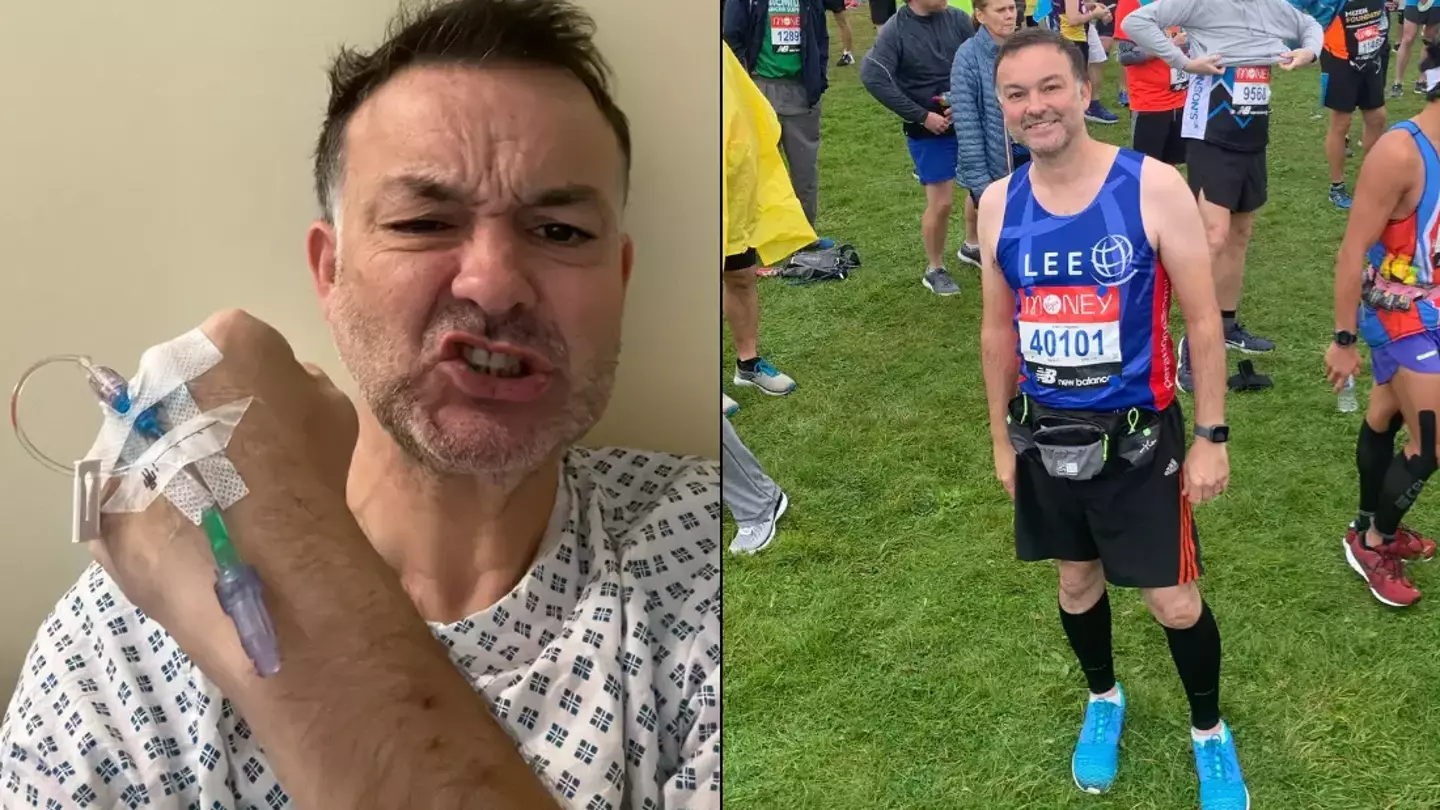
Updated 08:42 11 Dec 2024 GMTPublished 08:29 11 Dec 2024 GMT
Marathon runner diagnosed with terminal cancer only had one symptom that was easy to overlook
The father-of-two has been diagnosed with an incurable cancer and is preparing for his ‘last Christmas’

A marathon runner who has been diagnosed with terminal cancer experienced just one symptom before being told he has ‘months to live’.
Lee Rawlinson, 51, from Essex, is preparing for the ‘last Christmas‘ with his family after he was diagnosed with terminal pancreatic cancer on Halloween.
The father-of-two, who worked a medical sales representative, said doctors told him on 31 October that the cancer was inoperable and had spread to his liver.

Father-of-two Lee Rawlinson has been diagnosed with an incurable cancer and is preparing for his ‘last Christmas’ (PA Real Life)
Despite the horrible news, Lee still went trick-or-treating that evening with his children, Darcey, 10, and Marley, seven.
He waited until the next day to tell them about his diagnosis.
What is pancreatic cancer?
Pancreatic cancer is a type of cancer that develops when cells in the pancreas grow out of control, and form a tumour.
It is the deadliest out of the common cancers, with more than half of people dying within three months of a diagnosis, according to Pancreatic Cancer UK.
Pancreatic cancer symptoms
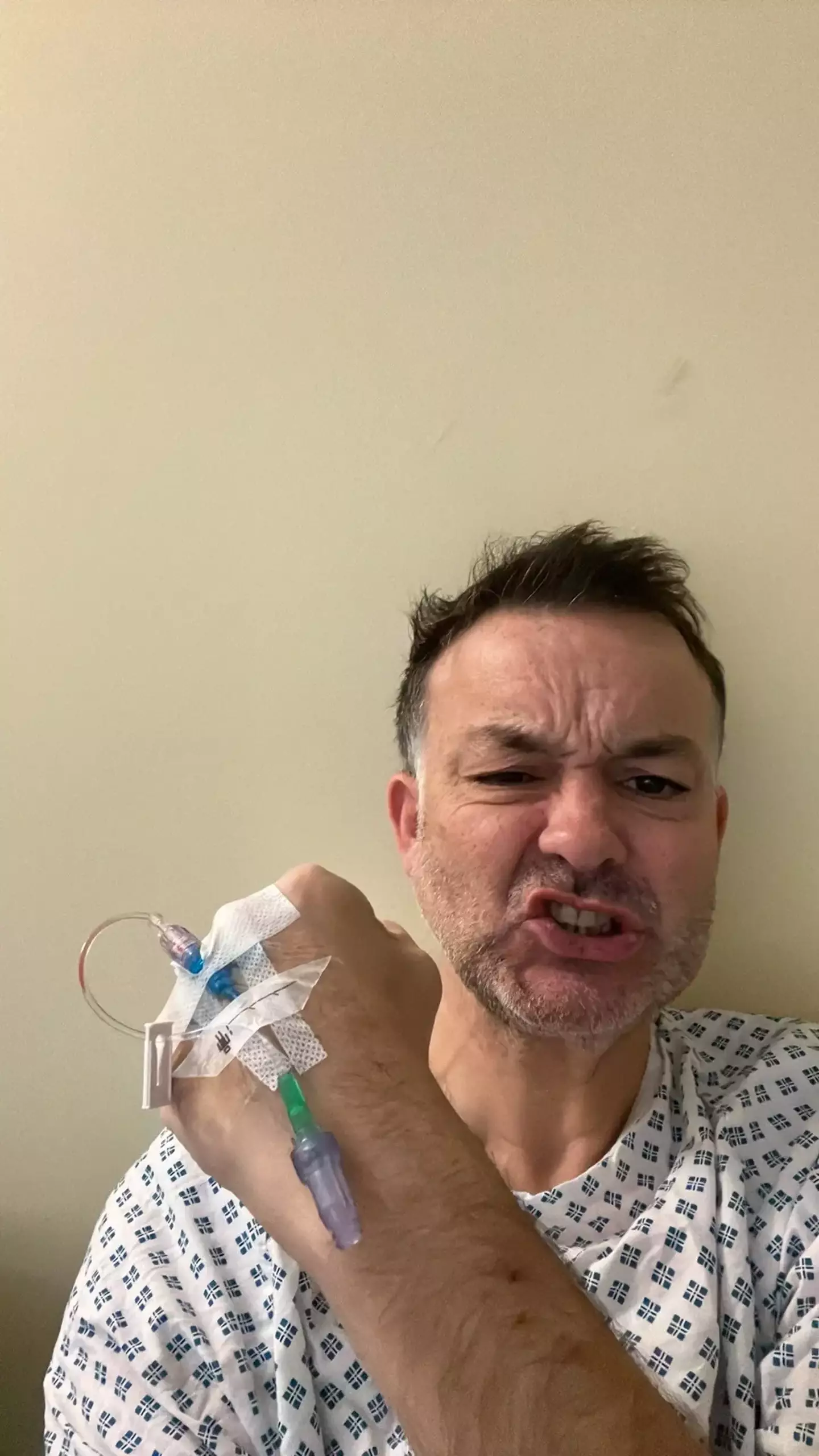
Lee said he’s ‘wanted to raise awareness for this horrible disease’ (PA Real Life)
According to the NHS, symptoms of pancreatic cancer can include:
- The whites of your eyes or your skin turn yellow
- Itchy skin
- Darker urine
- Paler poo than usual
- Loss of appetite or losing weight without trying to
- Feeling tired or having no energy
- A high temperature, feeling hot or shivery
- Feeling or being sick
- Diarrhoea, constipation, or other changes in your faeces
- Pain at the top part of your stomach and your back
- Indigestion or a bloated stomach
Lee’s single symptom

Lee says his family’s ‘worlds have been blown apart’ (PA Real Life)
Back in January, Lee said he started experiencing a ‘dull ache’ in his lower abdomen in January and he simply passed it off as a symptom of stress.
After a GP visit, he was referred to a gastroenterologist and after a 21-week wait, his blood tests came back all clear.
However, his stomach pain became unbearable in September as the dad explained to PA Real Life: “I was taking painkillers every day, and co-codamol, and it wasn’t touching the sides.
“If you can imagine a scaffolding pole and someone slowly pushing it through you, right through to your back, it was like that.”
“This will be my last Christmas,” Lee, who also has Type 2 diabetes, added.
“I’m facing the jaws of death. I’m sailing towards it and I can’t do anything about it, yet I just have to face it.
“I don’t fear death, I fear leaving my children and Faye behind – not being able to be there when they’re in trouble, not being able to make it better when tears flow, watching Marley developing his football, watching Darcey developing her theatrical talents, not being able to be there for Faye.
“Survival for pancreatic cancer has barely improved since the 1970s and it’s got to change. I want to get people to sit up and listen and think, what can we do for this not to destroy another young family’s life?”
Lee says his last days are ‘going to be amazing’
The family will be heading to Arsenal’s upcoming Premier League game against Crystal Palace at the Emirates Stadium on 18 December.
Lee has thanked the community for the way they have ‘come together’ to help out with the family’s next adventure to Lapland in Finland.
“The kids have never been on a plane before, so they’re going to fly for the first time and look out the window and see snow, and I’m going to see their reaction,” he said. “It’s going to be amazing.
“We are living the magic dream. Through such sad circumstances, we are living our best life.”
If you’ve been affected by any of these issues and want to speak to someone in confidence, contact Macmillan’s Cancer Support Line on 0808 808 00 00, 8am–8pm seven days a week.Featured Image Credit: PA Real Life
Topics: Cancer, Health, UK News

Anish Vij
Advert
Advert
Advert

Published 12:27 10 Jun 2024 GMT+1
Doctor warns of cancer symptom that could be ‘dismissed’ by Brits during summer
It is an easy-to-spot symptom that a lot of people would brush over, but it’s important to keep an eye out for it at night

There is one cancer symptom that UK residents should keep their eye out for this summer, according to a doctor.
It’s something that all of us will go through in the coming months, and it’s worth keeping tabs on, as though many may think it’s normal, it could indicate something serious for your health and well-being.
As the summer months have arrived (apparently), the temperature is set to rise and be higher than it has been recently (again, apparently), as the UK enters a period some warmer and more pleasant weather.
Though some of us may be sat staring out of the window and witnessing a downpour in the middle of June, there is the comfort of knowing that we’re not even two weeks into summer.
It couldn’t get any worse, could it? I guess time will tell.

Warmer weather could mean a number of things. (Getty Stock Photo)
When the temperature gets up there, our body responds by producing sweat, which cools our body temperature down, keeping it regulated and stopping us from getting heat stroke or shutting down altogether.
During the day, the heat may leave our soaks more soaked than normal, but it turns out that it may not be as normal of an occurrence at night.
You may find yourself dismissing the severity of sweating in your sleep in this weather, because it is summer after all.
However, a doctor has warned that night sweats could easily signal serious health issues, with one of these being cancer.
Dr Suhail Hussain is a personal physician and private home visiting GP, and has urged Brits to look out for sweating at night – especially if it is common.
“Sweating at night is a common phenomenon and one that is far more likely to happen on hot sticky nights such as we’re experiencing now,” he explained as per The Daily Express.
“However, the occurrence of such symptoms should not merely be dismissed as, ‘Oh well it’s just hot outside’.
He revealed: “Night sweats can be a sign of something more serious, for example, serious infections, the menopause and even cancer.”
There is a difference between regular night sweats and potentially cancerous ones though – and it’s important to note the contrast from one to the other.

There are a number of signs that can indicate if you’re having cancerous cold sweats. (Getty Stock Photo)
Dr Hussain said: “Sweats associated with cancer are normally drenching – literally. You can wake up with your pyjamas and bed sheets wringing wet with sweat.”
As well as this, the medical expert highlighted other glaring signs that, if seen, should be brought up with a doctor:
- Persistent and sweats that aren’t remitting – regular night sweats will usually be intermittent.
- Fatigue or a lack of energy in day-to-day life.
- Unexplained bruises on your body
- Inexplicable pain
- Lymph node enlargement
- Sweating in the day that isn’t related to being too hot at night.
The most common cause of cancerous night sweats are leukaemia and lymphoma – which are cancers related to the blood and lymph mode systems.
This is why you may see enlarged glands and find yourself easy to bruise.
He further explains that rare forms of cancer can also cause sweating, with this group known as ‘carcinoids’.
By affecting hormonal function through the neuroendocrine system, it can result in excess sweating.
Dr Hussain said: “Other concomitant symptoms could include flushing of the skin, alterations in pulse and blood pressure and muscle and joint aches.
“The bottom line is that if you feel like sweaty Betty or perspiring Pete and it’s going on a bit too long, then head over to your GP and get checked out.”Featured Image Credit: VioletaStoimenova/Tatsiana Volkava/Getty Images
Topics: Health, Cancer, UK News

Joshua Nair
Advert
Advert
Advert
.webp)
Published 15:21 12 Nov 2024 GMT
Doctor who diagnosed herself with stage four colon cancer reveals two ‘mild’ warning signs she discovered
The gynaecologist from Florida has opened up about the two worrying symptoms that lead to her cancer diagnosis

A doctor who diagnosed herself with stage four colon cancer has shared the two ‘mild’ symptoms she discovered.
US-based gynaecologist Lauren Juyia was diagnosed in August 2022 when she started to notice a couple of changes to her body.
Aged 37 at the time, the doctor went to HCA Florida Oak Hill Hospital to undergo an ultrasound, which revealed large masses in her ovary.
A mass is a lump in the body, and although it doesn’t always mean cancer, the quicker it grows, the more worrying it can be.
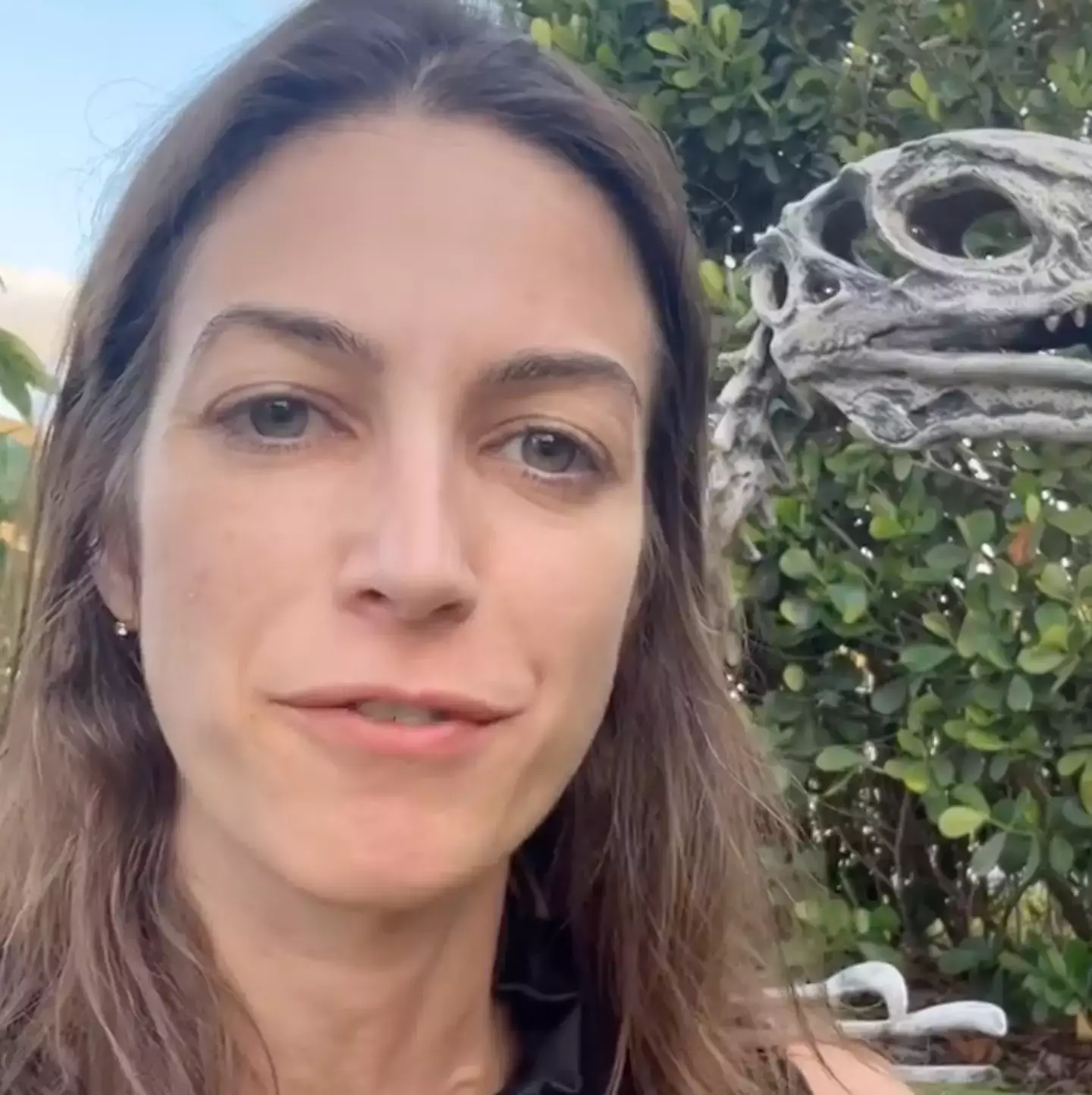
Lauren was 37 when she was diagnosed (Instagram/@thebenigngyn)
Just two weeks later, Dr Juyia’s mass had grown from 8cm to 24cm.
“I had never seen anything benign, meaning not cancer, grow that fast before,”she told Good Morning America in 2023.
“So we kind of knew, deep down, that this was not going to be good.
“And we suspected ovarian cancer of course, because it was the ovaries being the masses.”
A month on, the masses had spread to her ovaries, uterus, omentum, appendix, and abdominal area.
What is colon cancer?
Colon cancer, or bowel cancer, is one of the most common types of cancer in the UK and can be found anywhere in the large bowel, which includes the colon and rectum.
Dr Juyia’s symptoms
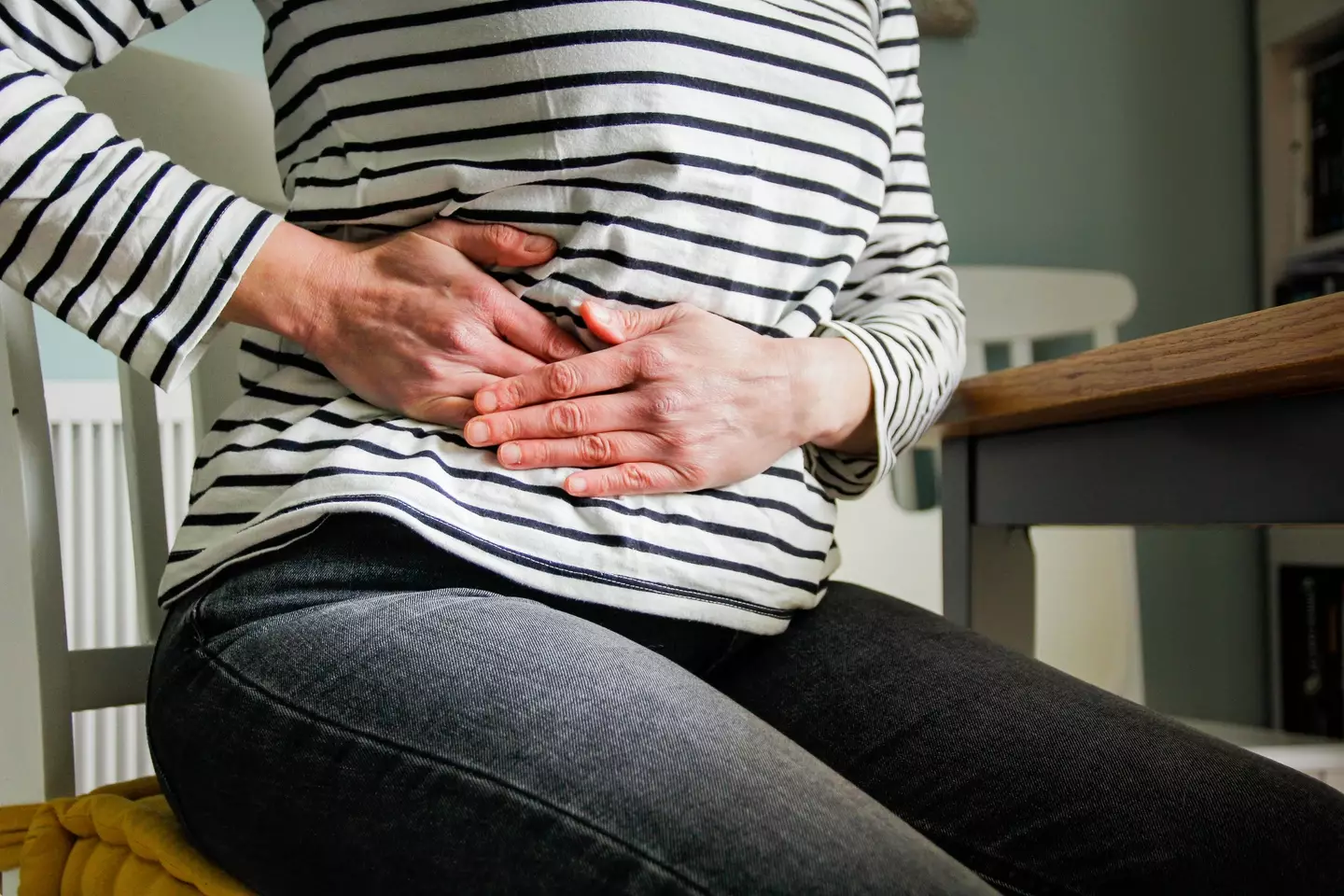
The doctor first noticed a mass in her pelvis (Getty Stock Images)
While symptoms usually range from having blood in the stool, irregular poos and weight loss, Dr Juyia didn’t experience any of these.
Instead she noticed a ‘pelvic heaviness’, which turned into a ‘pelvic mass’.
“Having a background in obstetrics, we describe size by weeks of pregnancy and so I was like, ‘Oh my god, I have a 16-week-size mass.’ From experience, I could tell that this was my ovary,” she said.
“I was a little tired in the afternoon for about two months previous to this and as a mum with two little kids – I had been recently nursing them, they were still waking up in the night, I work full time – I didn’t think anything of saying, ‘Oh, I think I need a tea in the afternoon’,” she said after getting her colon cancer diagnosis.
“Whereas maybe someone in their 50s or 60s would be much more tired from stage 4 tumours taking up their energy.”
Following her cancer diagnosis, she began chemotherapy treatment and carried on working to get her mind off the ordeal.
She underwent surgery in March 2023 and, thankfully, there has been ‘no evidence of disease’.
“People that are younger than the screening age (45) should still be paying attention to our symptoms because we’re not eligible for screening usually,” she explained.
“We might not have any symptoms because we are young, our bodies are more resilient. We can tolerate more symptoms.”
If you’ve been affected by any of these issues and want to speak to someone in confidence, contact Macmillan’s Cancer Support Line on 0808 808 00 00, 8am–8pm seven days a week.Featured Image Credit: instagram/thebenigngyn
Topics: Cancer, Health, US News

Anish Vij
Advert
Advert
Advert
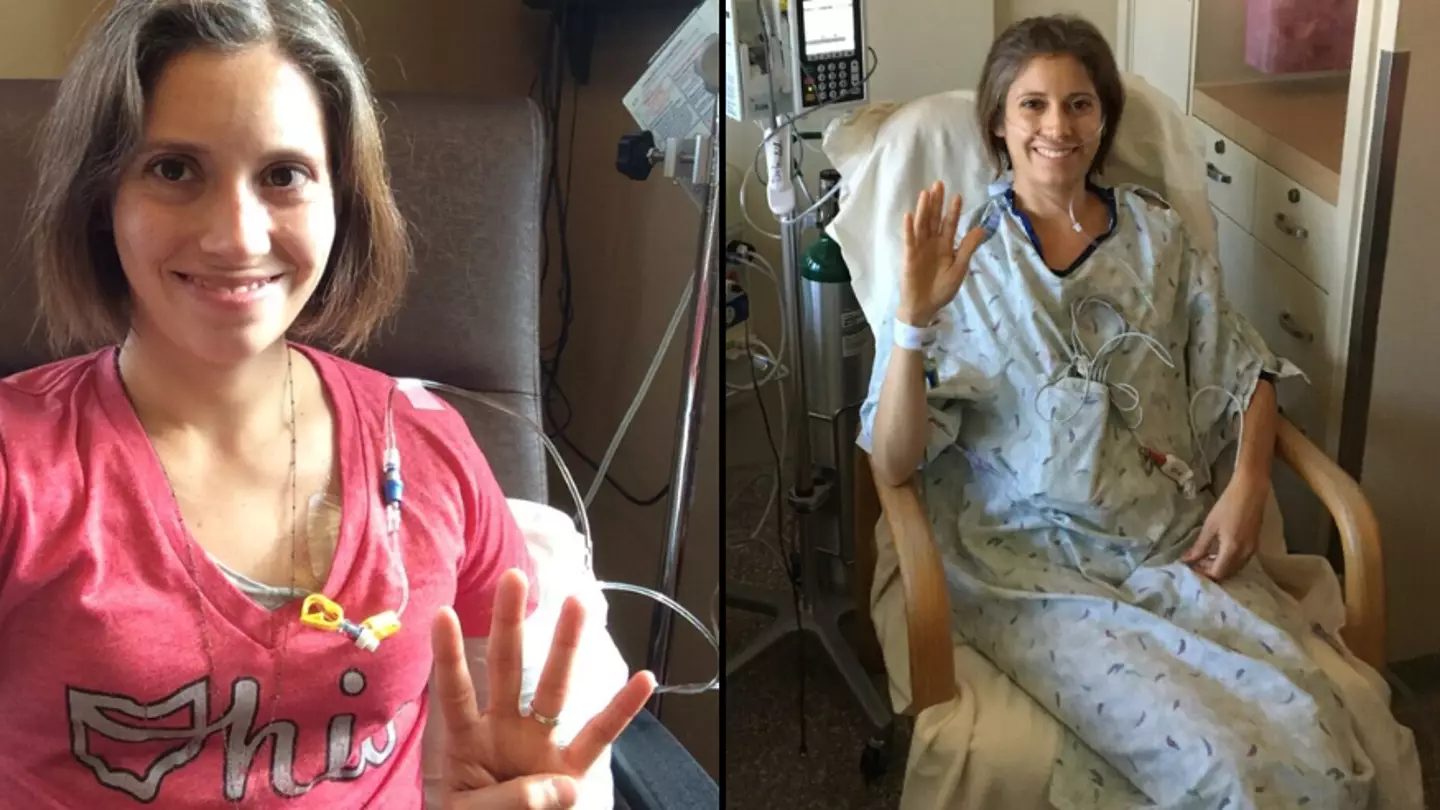
Published 11:14 20 Apr 2024 GMT+1
Woman diagnosed with stage 3 cancer after ignoring one ‘embarrassing symptom’
She has since undergone 28 days of treatment and surgery to remove her tumour

A woman has revealed she was diagnosed with stage 3 cancer despite initially dismissing an ’embarrassing’ symptom.
Jelena Tompkins, from Colorado, US, has shared her story in a bid to encourage others not to ignore their symptoms and raise awareness.
The mum-of-one was just 34-years-old in 2016 when she first noticed a change in her body, but dismissed her concerns as she was generally very healthy at the time.
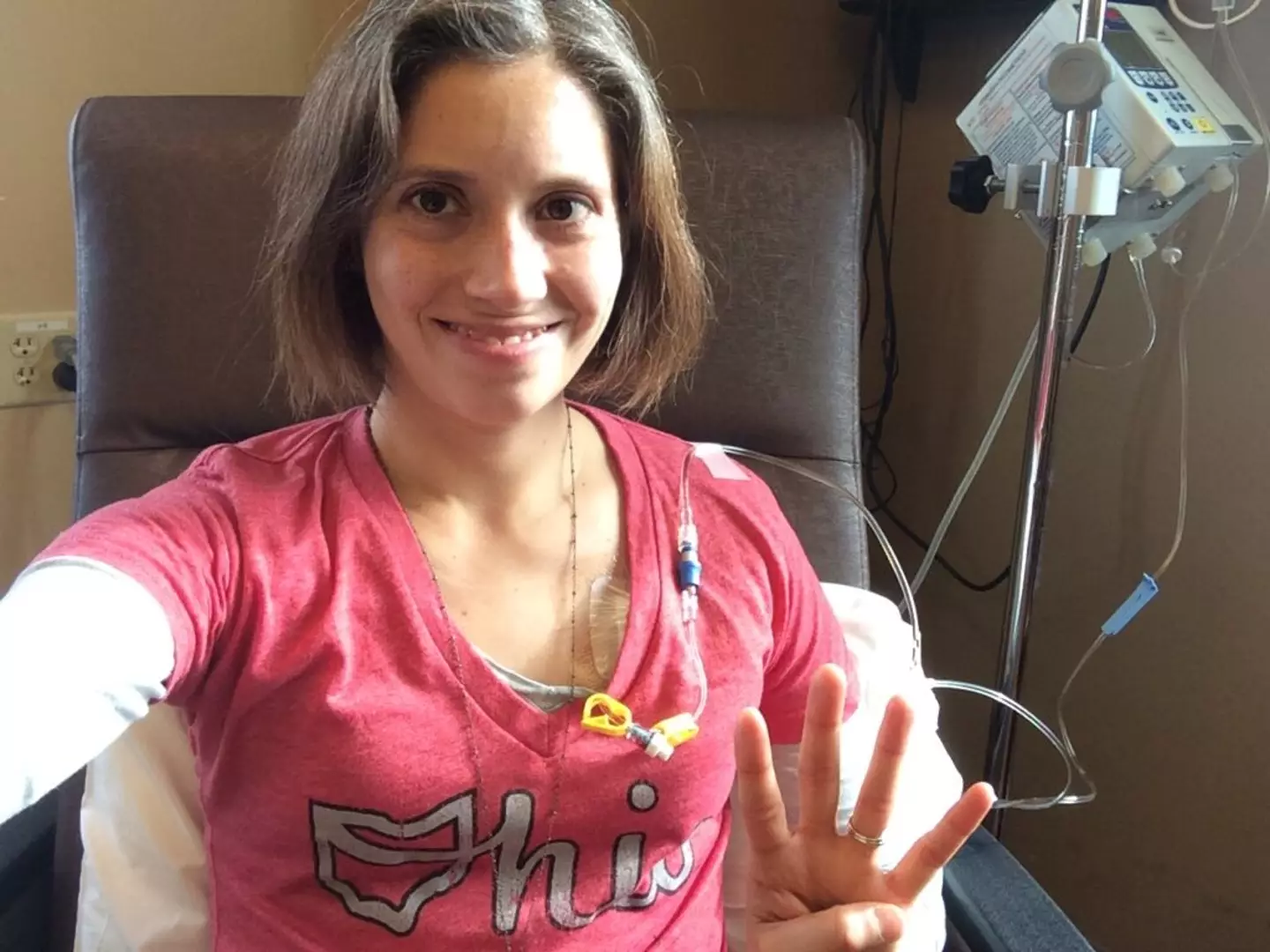
Jelena Tompkins wants to encourage others to not ignore symptoms. (The Patient Story)
Jelena had noticed her gas had started to smell worse than usual, but she put this down to her healthy diet, which contained plenty of vegetables.
She began taking probiotics to improve her gut bacteria, yet the smell did not improve.
However, Jelena – who is an avid runner – didn’t grow concerned about the change in her gas until she noticed blood in her stool.
A few months later, at her annual check-up, she told her doctor about the blood and they also guessed it was down to her diet.
Three months later, doctors began doing tests to determine if Jelena was eating a specific food which was upsetting her digestive system. This led to her having a colonoscopy, which sadly revealed she had stage 3 rectal cancer.
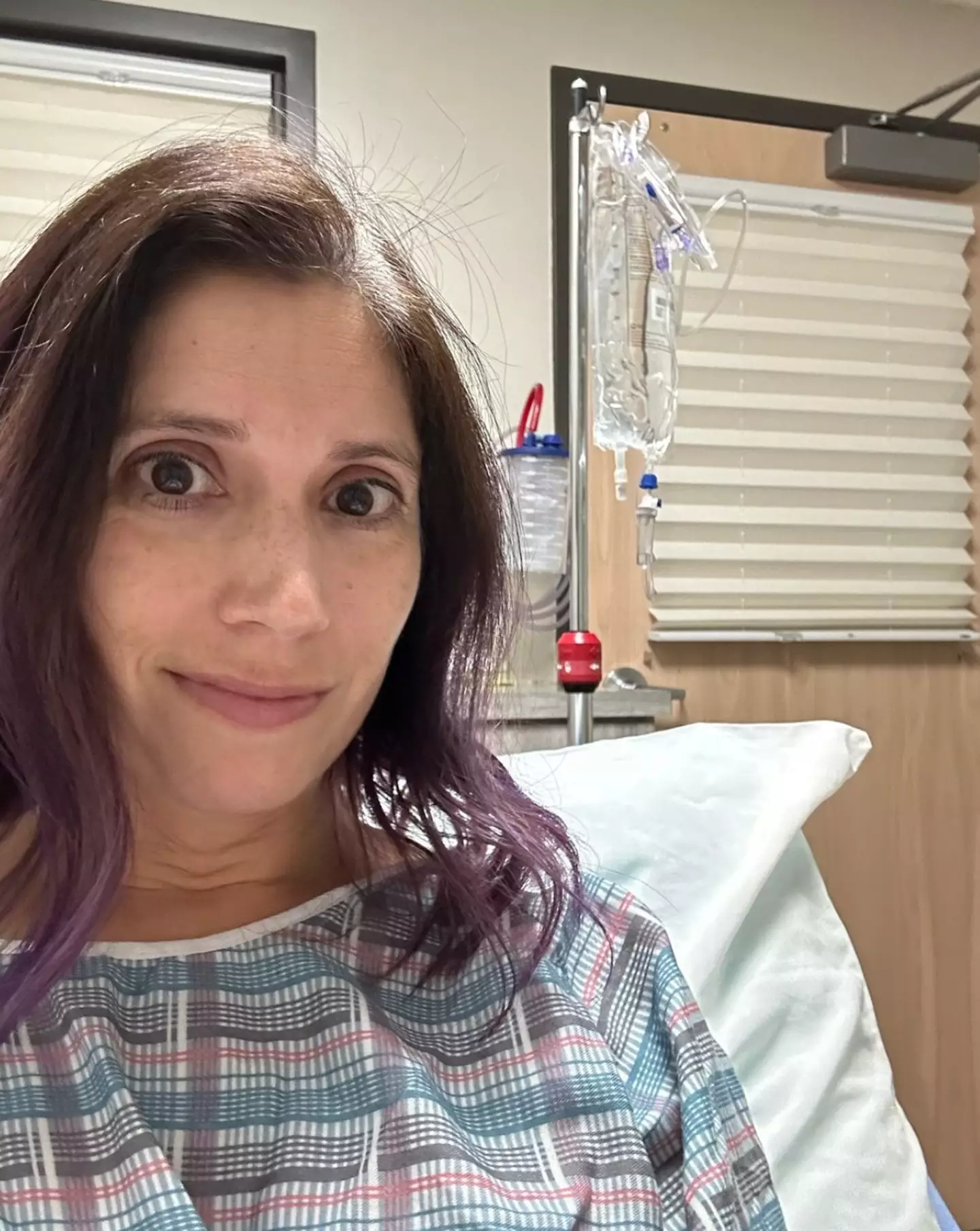
Jelena was sadly diagnosed with stage 3 rectal cancer. (Instagram/@colorado.jelena)
“I was in some of the best shape of my life. I ate healthily and never thought that cancer would strike me at such a young age,” the mum told The Patient Story.
She opted to undergo 28 days of radiation and oral chemotherapy, followed by surgery to remove the tumour.
12 inches of Jelena’s colon were removed as well as 17 lymph nodes, leaving just five cancerous nodes remaining.
She then had an ileostomy – a procedure whether a small hole is made in the abdomen and a piece of ileum is brought out through the hole to create a stoma.
2 months after her final round of chemotherapy, Jelena had her ileostomy reversed.
Jelena, who had no family history of cancer, is now in remission and undergoes maintenance chemotherapy and annual scans.

The mum-of-one is now thankfully in remission. (The Patient Story)
“I went in, at first, every 3 months for CT scans and checking my CEA and my bloodwork to make sure all my blood counts were bouncing back,” she told The Patient Story.
“Eventually, it got strung out to every 6 months, every year, and now I am just going in once a year for follow-up blood work and to check in with my oncologist.”
She credits social media for helping her with her diagnosis, having found support online from others going through similar.
Jelena said: “I connected with so many others that had either finished treatment or were going through treatment at the same time as myself to just have that support group and know I wasn’t the only young woman that was going through this.”
If you’ve been affected by any of these issues and want to speak to someone in confidence, contact Macmillan’s Cancer Support Line on 0808 808 00 00, 8am–8pm seven days a week.